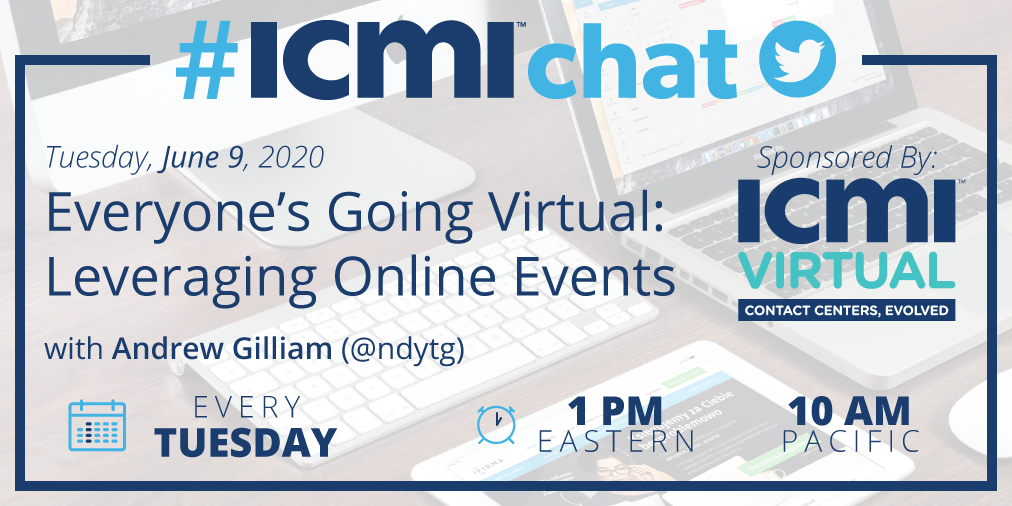By
The Editors
|
Date Published: June 03, 2020 - Last Updated September 08, 2020
|
Comments

Leaders touch our lives every day, whether it's a boss who motivates us or the champion of a cause we're passionate about. They help us to be our best selves and guide our focus through tough times. Many of us are leaders ourselves. Through our work, hobbies, or within our family, we influence others in one way or another. Being deliberate about how we lead people helps create the positive outcomes we want.
Join us on Tuesdays at 1 p.m. Eastern, 10 a.m. Pacific to weigh in on the contact center industry's most pressing challenges. Next week, we explore "Everyone’s Going Virtual: Leveraging Online Events." A question preview follows this article.
We don't always get to choose who leads us, and we often don't determine who we lead. We may not have even decided to be a leader, instead of falling into the role as part of our career progression or filling a void. This week, #ICMIchat shared stories of leaders who inspire, unite, and drive us toward collective and individual successes.
Leading Versus Managing
In the business world, the terms management and leadership are often used interchangeably. Although they are markedly different terms, organizations need people who can exercise both traits well. Leaders need to be good managers to keep team objectives on track, and managers require charisma and vision to motivate their teams and unlock employees' discretionary effort.
Managers get things done by other people. Leaders inspire people to manage themselves. Teams need both because human beings come in all personality types.
Managing is making sure the day to day gets done. Leading is seeing the untapped potential in others and inspiring and equipping them to achieve it.
People Need Leadership
When managers focus only on metrics, policies, and strategic plans, they overlook the most vital ingredient to customer service success: people. Overbearing managers hinder employees' ability to practice good judgment and learn to make decisions for themselves. Employee empowerment is crucial to top-notch service delivery, but empowerment must be taught in the context of its mission and culture.
People at work need purpose. Without purpose people will work focused on the money and will leave you if they can get paid more somewhere else. As Simon Sinek aptly states, "Start with Why."
Sure, a managerial approach that lacks leadership leads to teams getting bogged down in the rules and losing sight of the guiding vision. Anytime the situation can't be decided by a "rule" employees are lost.
Everything we know about workplace culture & organizational mission points to the downfall of a strictly “management” approach. Management is WHAT we are doing. Leadership communicates WHY we are doing it. Without the WHY, the WHAT doesn't matter much.
Indispensable Ingredients
Leaders and managers must build a culture of trust, transparency, and humility to foster healthy and collaborative working relationships. The best leaders are not only approachable but also accountable and acknowledge their missteps and limitations. While titles may bestow official authority, they do not necessarily instill respect.
Many great leaders are found in the workplace, and they differ in important ways. But you rarely find a great leader who is not also a great communicator. In today’s environment, both transparency and approachability are important for employees and shareholders alike.
Approachability, communication, and transparency help build rapport and strengthen internal bonds. Clearly defined objectives and flexibility meeting them boosts employees chances at success.
Building Rapport
Respect of team members is earned over time; it's a continuous process that challenges leaders to be better every day. A great way to begin the process is by learning about the work your employees do and their personal and professional aspirations. Where possible, finding ways to align your contact center's objectives with employees' goals makes gaining buy-in and dedication much easier.
You have to be able to care about all of your team members. Spend time with them, listening more then talking. Understand their job - the complexities and challenges in addition to the positive things. Acknowledge the challenges and work to improve them.
Show them how it’s done. Be on the front lines. Get your hands dirty. Understand their challenges and find solutions that help them. Be a sounding board for them. Reward publicly and reprimand privately. Help them carve out their better selves.
Virtually Wandering Around
Management By Wandering Around (MBWA) is an old concept suggesting that managers can have productive interactions with employees by meeting them in their environment, regularly, without schedules or agendas. The idea is that impromptu communication triggers learning that you wouldn't otherwise have sought out. This idea works great in an office, but you obviously shouldn't go barging into employees' homes. MBWA is adaptable to remote work, with a few tweaks.
I thought it was helpful - being visible and by approaching others you become more approachable. It's more difficult virtually, IMO. I suppose you have to be more strategic about it. Random IM's, skip level 1:1's, and a venue for feedback is helpful.
One way or another you need face time with your people and when you don't have the convenience of walking out on the contact center floor, you're gonna have to schedule it!
Management by wandering around is a great approach. While wandering, actively listen, notice details, and give genuine praise. Make it a practice to let a team member you didn’t interact with know you observed them by emailing or chatting later to give a compliment!
Employees First
Great organizations and great leaders realize the value that people bring to the team. They take the time to understand their employees and put them at the forefront of their decisions. It's not always easy, and it doesn't always lead to short-term gains. However, this discipline is how organizations develop sustainable, irreplicable cultures that drive the business forward.
To me, servant leadership is about caring for the ppl you lead and wanting to develop and challenge them to be their best self, while holding them accountable and striving to meet goals of the org.
Very simply for me it was learning to not be a jerk when an agent asked me their 20th question of the day and recognizing that my response had a lot to do with how well they did their job. Servant leaders care about the success of others.
I think I kinda answered this for the IB question. Servant leadership is the willingness to serve FIRST those you are leading Tip: It is NOT a weakness and/or lack of decision making.
Serving Your Team
Servant leadership doesn't always require grand gestures. Small acts of courtesy, removing obstacles, and friction from an employee's work life, can be just as meaningful. Doing so also models and encourages organizational citizenship behaviors, that is, going beyond one's minimum job to advance the organization.
Leaders should engage with their employees and get to know them as an individual and the strengths they bring to the org. Personalize the conversations so employees feels appreciated and valued for their contribution to the success of the org.
Whatever collaboration tool, read through agent conversation in a given day with the goal of eliminating one pain point for your agents. Fix a bug, help with a noisy customer, clarify ground rules about an issue, offer training, buy lunch, etc.
Leadership Without Power
Not all leaders have a fancy title to go with it. Sometimes an organization's most respected and influential leaders don't even get a seat in the board room. As a leader yourself, ready yourself to help your emerging leaders and high potentials develop and succeed.
You can be an informal leader w/out a title that ppl naturally turn to and follow. Someone who manages would typically have a formal title and decision making power, etc. Ideally, your managers are good leaders and your informal leaders are being developed to manage.
With a hat tip to Mark Sanborn, "You don't need a title to be a leader." and Craig Groeschel, "People would rather follow a leader with a heart than a leader with a title."
Emerging leaders can lead by gaining respect first with high quality work. Then, mentor one or two people. Gain credibility within the group. Now, people will start listening to you.
#ICMIchat June 9, 2020
Everyone’s Going Virtual: Leveraging Online Events

This #ICMIchat is sponsored by ICMI Virtual; register to join us for free on Wednesday, June 17, or watch on-demand. This thrilling one-day summit delves into maximizing your technology investments, transforming the agent experience, improving the customer experience, and using metrics to tell compelling stories.

Q1: Have you been attending more virtual events, webinars, and online classes since safer-at-home orders took effect? Do you plan to continue, or are you getting burned out?
Q2: What is your favorite virtual event format, e.g. all-day events, standalone webinars, recurring series? Why?
Q3: What type of virtual event content is most impactful for you? Do you prefer presentations, panels, roundtables, or something else?
Q4: How do your expectations for virtual events compare to live in-person events? Are online events a good use of your time/return on investment?
Q5: How can leaders maximize the value of online content and events to develop their teams’ skills and abilities?
Q6: How can teams work together to make the most of their time spent in attending virtual events?
Q7: What is the best way to network with industry peers and make friends while attending virtual events? Is this still important?
Q8: What is the one thing you want virtual event organizers, marketers, and content creators to keep in mind when planning future projects?
Photo by magnezis magnestic from Unsplash.